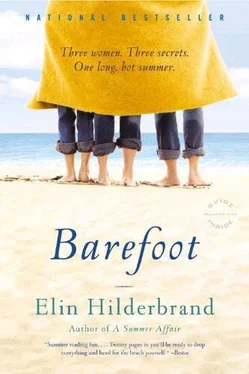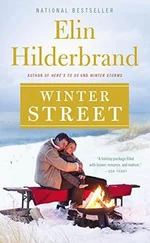Elin Hilderbrand - Barefoot - A Novel
Здесь есть возможность читать онлайн «Elin Hilderbrand - Barefoot - A Novel» весь текст электронной книги совершенно бесплатно (целиком полную версию без сокращений). В некоторых случаях можно слушать аудио, скачать через торрент в формате fb2 и присутствует краткое содержание. Жанр: Старинная литература, на английском языке. Описание произведения, (предисловие) а так же отзывы посетителей доступны на портале библиотеки ЛибКат.
- Название:Barefoot: A Novel
- Автор:
- Жанр:
- Год:неизвестен
- ISBN:нет данных
- Рейтинг книги:4 / 5. Голосов: 1
-
Избранное:Добавить в избранное
- Отзывы:
-
Ваша оценка:
- 80
- 1
- 2
- 3
- 4
- 5
Barefoot: A Novel: краткое содержание, описание и аннотация
Предлагаем к чтению аннотацию, описание, краткое содержание или предисловие (зависит от того, что написал сам автор книги «Barefoot: A Novel»). Если вы не нашли необходимую информацию о книге — напишите в комментариях, мы постараемся отыскать её.
Barefoot: A Novel — читать онлайн бесплатно полную книгу (весь текст) целиком
Ниже представлен текст книги, разбитый по страницам. Система сохранения места последней прочитанной страницы, позволяет с удобством читать онлайн бесплатно книгу «Barefoot: A Novel», без необходимости каждый раз заново искать на чём Вы остановились. Поставьте закладку, и сможете в любой момент перейти на страницу, на которой закончили чтение.
Интервал:
Закладка:
This is it, she thought. Ted squeezed her hand. Vicki thought: Blaine! Porter! She imagined them in her mother’s arms, in Brenda’s arms. Safe and sound.
She woke up in pain. Hideous pain, straight from the fire pits of hel . She woke up screaming.
A nurse gave her a shot in the arm. “Morphine booster,” she said. “You have Duramorph going into your spine as wel .”
Stil , Vicki screamed. She thought she might feel elation or at least a deep relief at finding herself alive; she had, somehow, made it through the granite tunnel. But as miraculous as that seemed to her intel ect, it was impossible to process because of the pain. With the pain, there was only one thought . And therein lay the irony: The surgery that had saved her life made her wish that she were dead.
It lasted an eternity. There was a blur of activity: people, machines, procedures—but none of it translated. Vicki, who hated to cal attention to herself, especial y in a public place, among strangers, screamed for hours. Vicki, who liked to be in control at al times, was not only screaming and howling like an animal, but begging, too. Help me! Help me! Dear God, please help me!
And then, quiet. Dark. A soft beeping. A dark face hovering above hers. A nurse. I’m Juanita, she said. How are you feeling?
Vicki was sore in some places, numb in others. Her throat was kil ing her. Her mouth was dry, her lips cracked. She was thirsty. Juanita put a straw to her mouth. The water was cold, as cold as the ice water with paper-thin slices of lemon that Brenda had put by her bedside al summer.
Vicki started to cry. The water tasted so good. The summer had been so beautiful, despite everything. She was alive.
Vicki does not want to frighten anyone in the group, but she can’t bring herself to candy-coat things, either. The recovery was long, it was hard (Vicki means to use the word horrible, but she stops herself at hard ). She had seven mil ion stitches through al the muscles she needed to get anything done. With every cough, every sneeze, every laugh or exclamation, she felt stabbing pain along the miles of her incision. She felt like she was going to break open, burst apart. If the cancer had hurt, and made breathing hard, it was nothing compared to how she hurt now, to how she labored for air. Vicki only had one lung remaining. Even feeding herself, even taking a shower, even reading a picture book wiped her out. She couldn’t stand to be awake, and so she slept for great portions of the day. Morphine gave way to Percocet and Percocet to Advil. Vicki went through fifty Advil a week. And stil , the pain. For weeks, Ted carried her up and down the stairs. Friends and neighbors brought meals, they sent cards, books, flowers; she heard them whispering, How is she? What else can we do? They took Blaine and Porter for playdates. El en Lyndon had to go back to Philadelphia at the end of the month. Brenda came two days a week, but the rest of the time she was busy working as a manager at Barnes & Noble and trying to sel her screenplay to a studio that would actual y produce it. Brenda’s life, in essence, was busy and back on track, which was great news for her, but Vicki stil needed help. Don’t leave! Vicki’s voice had returned, like magic she could speak again and she was amazed by this restoration, relieved at how the words she held in her mind flowed right out into the world—but everything she said was negative, unpleasant, confrontational. When Ted suggested hiring a live-in nanny, Vicki said, I don’t want a stranger taking care of my children. I only want Josh. To which Ted snapped, Well, I doubt Josh is available.
After six weeks, Vicki went in for her postoperative scan. Dr. Garcia said the pictures looked “clean.” Vicki appeared to be “cancer-free.” Ted bought champagne. Vicki drank some from a Dixie cup, but that night Porter howled from his crib and the next day he broke out in red spots.
Chicken pox, contracted on one of the playdates. Ted took the week off from work. Vicki cursed herself for not being able to deal with it. She couldn’t do anything —she couldn’t care for Porter, she couldn’t go to the grocery store, she couldn’t trick-or-treat with the kids, she couldn’t plan a baby shower for Melanie. She was stil in such pain, her faculties were compromised. Her body had been invaded. She had been sliced open and stitched back together like a rag dol . Part of her incision became infected. There was an unusual y severe soreness, a smel , redness, and an oozing pus. She ran a fever. Dr. Garcia prescribed antibiotics.
Vicki felt empty, and she imagined her chest cavity as literal y empty. She imagined that, along with the cancer, Dr. Jason Emery had removed her capacity for getting things done, her good luck, and her happiness. She went to physical therapy; she went back to the psychotherapist.
She was better, yes. She was cancer-free, cured, a survivor. But she wasn’t herself—and what was the point of getting better if her essential Vicki-ness had been lost? Al her life, things had come easily. Now, the only thing that came easily was lying in bed and watching TV. She became addicted to the soap opera Love Another Day and hated herself for it.
“Recovery is a long, tough road,” Vicki tel s the group. “But in my case it was a road with an end.”
Somehow, she pul ed herself up. In spite of her deep despair, the lingering pain, the adjusted expectations, or perhaps because of them, she got better. It might have started with something little—a note came from Dr. Alcott, Ted made a joke and she laughed without splitting open, she had enough stamina to stand at the counter and make a sandwich. She fol owed her therapist’s advice and built on these minor successes rather than dismissing them.
Now look at her: Five months later, she is here, in the circle, head bowed for closing prayer. She has changed. She is cancer-free, yes, but the change is something else, something more elusive, harder to pinpoint. She has been on a journey, and the place she finds herself now is the place she hopes everyone else in this circle wil arrive. It is a place of wonder. It is a place of enormous gratitude.
You don’t believe in a greater plan? Josh had asked her.
Vicki’s answer—stil —is I don’t know . Some people in the circle wil die, some wil live. Who’s to say which wil happen, or why?
I want to throw her back. I want to let her live. Could it al be just that random?
Vicki recal s the night she stood on Sankaty Bluff, with the waves pounding the beach below her and the embarrassing riches of the night sky above.
Everything matters. Every little thing.
“Amen,” Dolores says.
The closing prayer is over. Vicki has missed it. Or has she?
ACKNOWLEDGMENTS
This book marks a new beginning for me. I would like to thank my agent, Michael Carlisle, for his wise counsel; he has been with me every step of the way. Also, David Forrer, for his canny suggestions, which resulted in a better book al the way around. I thank Jennifer Weis and Sal y Richardson for sticking with me through seven years and five books; they are both extraordinary women. At Little, Brown, I would like to thank Reagan Arthur and Michael Pietsch for taking me on with such enthusiasm, as wel as Oliver Haslegrave for his gal ant assistance. I feel like I have been born anew.
Thank you to Dr. Wil iam G. Porter, who is not only a friend and a discerning reader/critic, but an oncologist. We talked extensively about lung cancer and its various treatments. Any inaccuracies in the text, however, are mine alone. Thank you to Dr. Jason Lamb, thoracic surgeon, who briefed me on the pertinent details of a pneumonectomy. And thank you to my aunt, Ruthann Hal , who is a cancer survivor. Her details of chemotherapy and its mental / emotional/physical side effects were both inspiring and helpful.
Читать дальшеИнтервал:
Закладка:
Похожие книги на «Barefoot: A Novel»
Представляем Вашему вниманию похожие книги на «Barefoot: A Novel» списком для выбора. Мы отобрали схожую по названию и смыслу литературу в надежде предоставить читателям больше вариантов отыскать новые, интересные, ещё непрочитанные произведения.
Обсуждение, отзывы о книге «Barefoot: A Novel» и просто собственные мнения читателей. Оставьте ваши комментарии, напишите, что Вы думаете о произведении, его смысле или главных героях. Укажите что конкретно понравилось, а что нет, и почему Вы так считаете.












